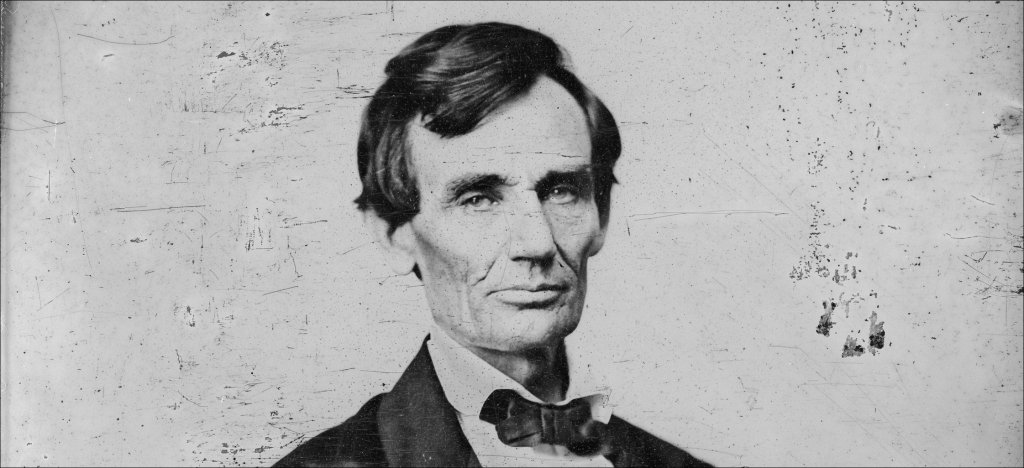
“I leave it to my audience. If I had another face, do you think I’d wear this one?” ~~ Abraham Lincoln, after being called ‘two-faced’ in a debate
It’s common knowledge Abraham Lincoln was not a handsome man, nor was he esteemed on first notice as graceful or socially adept. Described as homely, uncouth, rough-looking, a tall 6′ 4″ angular, awkward man in clothing that didn’t seem to fit, Lincoln was even said by some to be ugly. His remarkable face, height and flat-footed, springless walk never failed to make a powerful impression. As a London Times correspondent wrote: “It would not be possible for the most indifferent observer to pass him in the street without notice.”
But Lincoln, a dirt-farmers son was ambitious and determined to succeed. From the time he was a boy he was self-educated, an avid reader of any book or newspaper he could find. His stepmother remembered he was unusual, he had to understand everything, repeated facts to himself until they were “fixed in his mind.” With little formal education he left home at age 22. “I was a friendless, uneducated, penniless boy… a piece of floating driftwood.”
Early in his adult life, as he struggled in various business ventures and travelled, the people who came to know him said he was a gawky fellow, funny-looking, a rube they thought and looking like nothing they’d ever seen. But as soon as Lincoln spoke you were aware that he was far more than that first impression. He was literate, well-informed and educated. Lincoln was good-natured, delighted in self-effacing humor and was known to be a great storyteller.
Portrait painter, John Henry Brown wrote of Lincoln: “There are so many hard lines in his face that it becomes a mask to the inner man. His true character only shines out when in an animated conversation, or when telling an amusing tale.” Lincoln exerted a remarkable influence upon every one with whom he came into contact. Men who were opposed to him became fascinated when they met him, and few ever retained their hostility. He endeared himself to friends and associates.
Historian Doris Kearns Goodwin said: You always have the feeling that Lincoln … was not a very attractive sort of fellow … but the moment he started talking, the moment that voice attached to his heart and to his mind, he became something entirely different…. The people … grow to respect him. They see him as something more than the shuffling, penniless, gangly character that he appeared when he first walked on the streets.
A self-taught lawyer Lincoln was admitted to the Bar in 1836, just 5 years after leaving home a “penniless boy.” 20 years later he had a thriving law practice. He was a respected and highly paid attorney who argued before the Illinois Supreme Court and represented important railroad clients. In February 1860, after losing a second attempt for election to the U.S. Senate, and earning a national reputation from the famous Lincoln-Douglas debates, he was invited to New York to speak before the elite of the Republican party. It was an opportunity for the back-woods, prairie politician to show the party what he could do. Fifteen-hundred people crowded the auditorium. Some said when they saw Lincoln stand up, their first impression was, “Oh, my goodness. This will never do.” Even he admitted later he was uncomfortable, unsure of his audience, unsure of himself, but when Lincoln spoke, all doubts quickly vanished.
“Can we, while our votes will prevent it, allow slavery to spread? If our sense of duty forbids this, then let us stand by our duty fearlessly and effectively…. Let us have faith that right makes might, and in that faith let us to the end dare to do our duty as we understand it.”
When he finished the audience rose to their feet. “No man,” a reporter wrote, “ever before made such an impression on his first appeal to a New York audience.” It was a landmark event, the speech rocketed Lincoln to the front ranks of the party and into contention for a presidential nomination. Three months later and against all odds he was the Republican nominee for President of the United States. On the third ballot it was the delegation from Pennsylvania that put Lincoln over the top. Among those Keystone State delegates was the brother of my 2nd great-grandfather, Congressman John Patton.
Three years later the armies of the Union and the Confederacy fought one another at a town called Gettysburg in what would be the bloodiest battle of the Civil War. In November 1863 a cemetery honoring the war dead was to be dedicated there. Lincoln was invited to make a few remarks. It was not expected he would say anything memorable because one of the country’s leading orators, former Senator Edward Everett, would speak first for nearly two hours with a traditional grand oration. 15-thousand people witnessed the occasion, the ground still soggy from fresh graves. Following the Everett speech and a hymn Lincoln stepped forward and “with a manner serious almost to sadness, gave his brief address.”
Four score and seven years ago our fathers brought forth on this continent a new nation …
He talked less than two minutes, a short 10 sentences, 272 words. But when Lincoln spoke he redefined the war, not just as a struggle to preserve the Union but also for the principle of human equality. Initially opinion was divided among partisan lines. The address received mixed, sometimes scathing reviews, deriding it as inadequate and inappropriate. But in time it would become known among the greatest of American speeches, one of the most powerful and poignant, with an enduring presence in American culture.
And the rest, as is often said, is history. Abraham Lincoln, belonging to the ages, died on this date [2014] 149 years ago today.
℘